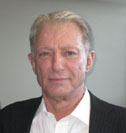..WERNER ERHARD
A Fuller View |
A Fuller View: Chapter 1.4, by Werner Erhard "Something hit me very hard once, thinking about what one little man could do. Think of the Queen Mary—the whole ship goes by and then comes the rudder. And there's a tiny thing at the edge of the rudder called a trim tab. It's a miniature rudder. Just moving the little trim tab builds a low pressure that pulls the rudder around. Takes almost no effort at all. So I said that the little individual can be What Bucky says here stands out for me because Bucky's words speak powerfully to something basic in all of us - the desire to make a difference, to have our lives matter. Bucky refused to be limited by the conventional wisdom that there is nothing one little individual can do to make a big difference. This notion led to a resignation that became a frame for living that for many people was disempowering. Bucky believed that every person is capable of making a profound difference in their own life and in the lives of others. He saw and spoke that the individual, any individual, has the power to take a stand, and live from the stand that who they are and what they do can make a difference, and that by, doing so they become a trim tab literally capable of turning the ship of life. Thanks to his grandson, Jaime Snyder (who had taken the est Training), I had the opportunity to meet Bucky. At the time, Jaime was 20, I was 40, and Bucky was 80 - Bucky liked the symmetry. As Bucky and I got to know each other, I heard what could inspire people. We invited Buckv to meet with graduates of the est Training and their friends and families, and between 1976 and 1979 somewhere close to 100,000 people came to hear Bucky in seven cities across the United States. One thing I've learned from having the privilege of interacting intimately with tens of thousands of people is that the hunger to make a difference and contribute is fundamental for us human beings. People are willing to take great risks when presented with an opportunity to make a difference. In a moment of crisis, Bucky discovered that in himself, and he found a way to speak words that allowed other people to get in touch with that passion for themselves. I watched people when Bucky spoke, and people heard him and were deeply moved and inspired to action by his words. In 1979 a group of UCLA scientists published a study of graduates of the est Training, "Separate Realities: A Comparative Study of Estians, Psychoanalysands, and the Untreated." The study concluded that est graduates had a high degree of concern for others (higher than the two comparative groups in the study). In the events Bucky did for est graduates he spoke to that higher degree of concern for others, profoundly validating each person who heard him. The analogy of the trim tab to shift the course of a giant ocean liner was met with enthusiasm. Participants adopted it and itnmediately began applying it for themselves, choos¬ing the difference they could personally make for themselves and for their communities. We founded The Hunger Project (committed to the end of hunger) with Bucky's participation based on these same principles that the individual makes the difference. Sam Daley-Harris and Jeff Bridges are well-known individuals who have demonstrated Bucky's principles. When Sam attended a Hunger Project event in 1977 he was a music teacher in Florida. Sam was deeply moved by the idea that "the little individual" could make a difference; he declared that he would create his "own form of participation in ending hunger," and in doing so created what has become his lifetime commitment to ending global hunger. Sam founded Results, which became the largest and most effective grass roots lobbying organization in the United States for the end of global hunger. In the late 1980s Sam met Muhammad Yunus, founder of the Grameen Bank in Bangladesh, and worked in partnership with him using the network he had established with The Hunger Project to get the Grameen Bank established throughout developing nations. In 2006 the Nobel Peace Prize was awarded to Muhammad Yunus and the Grameen Bank "for their efforts to create economic and social development from below." Sam continues his work as Director of the Microcredit Summit Campaign. Jeff Bridges is best known worldwide as an actor, In the early 1980s, he brought together entertainment industry leaders and Hunger Project volunteers to found the End Hunger Network with a commitment to bringing Americans together to end hunger in the United States. And he didn't stop there. In 2010, Jeff became the national spokesperson for the No Kid Hungry Campaign, dedicated to eradicating childhood hunger in America by 2015. These are only examples of individuals whose names you may recognize, but there are many thousands of individuals whose names you would likely not recognize who have embraced Bucky's words and live their lives as Trim Tabs. Bucky made it clear and accessible that every human being can make a difference. I honor him for his humanity, for his friendship, and for the legacy of possibility he leaves with us. I honor Bucky for having created in himself the humanity that let him say "Call me Trim Tab" in a way that every individual can continue to take actions that make a difference, putting their own feet out to turn the great ship. Chapter 1.4 by Werner Erhard: A Fuller View, by Steven Seiden (ed.) April 1, 2012
|
© Copyright 2008 - 2020
Werner Erhard
